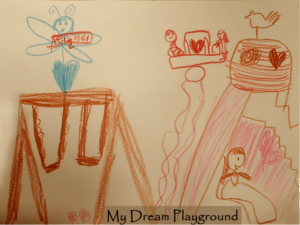Actualizing children’s participation in the development of outdoor play areas at an early childhood institution
Blog post by Sun-Mi Lee for article by Kwi-Ok Nah and Sun-Mi Lee
How much do we respect and hear children’s voices in early childhood classrooms? How can we encourage young children to contribute to decision-making about their education and everyday lives? It was not easy to tackle the idea of a democratic classroom especially in a South Korean context where an authoritarian culture prevails and childhood is subordinate to adulthood. In the present study, we helped Korean children develop expressive attitudes through various activities before the outdoor play area development project started. We also aided the children to generate informed opinions and to expand their current views by providing guidance and resources at appropriate moments. We helped empower the children and encourage them to lead the project. Later in the research, they began to perceive themselves as confident learners, developed the ability to communicate with others, and acted democratically. The educator also changed her outlook and attitude towards children’s rights and capabilities. Though we tried to include other educators and school administrators, our study was limited to one educator. Future research could include breaking hierarchical barriers between educators and senior staff members, especially school principals. This research opens the door for a broader discussion on child participation and democracy in early childhood classrooms.
You can access this article for free for the next 30 days by using THIS LINK.
After you’ve had a chance to read this piece, please share your thoughts, ideas, or experiences with our community so we can continue this discussion! The AR+ site is hosting a discussion forum for us to talk about our reactions and experiences related this topic. You can access the discussion forum HERE.
A quick (and free) registration is all that’s needed to join the discussion.
- Making Public Deliberations Inclusive with Mixed Methods AR - October 26, 2020
- Participatory action research with Aboriginal Elders: Ngulluk Koolunga Ngulluk Koort project - October 12, 2020
- Bringing the relational self to ART: Interview with Dr. Yvonne Skipper - October 1, 2020

